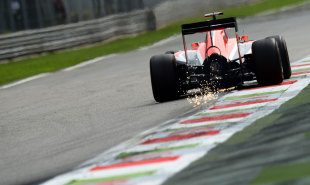

Self-interest in Formula 1? Why is anyone surprised?
The thing that surprises me, judging by hysterical reaction to the Marussia situation, is that some people believe F1 is a sort of cosy club that should feel obliged to look after its own. Try telling that to Enzo Ferrari if he were still around.
I'm not saying what's happened to Marussia is pleasant, correct, caring - or any of the emotional terms that have flooded website comments in the wake of rejection by the F1 Strategy Group. But it is to be expected if you have a system that allows the clowns to run the circus.
The absence of an authoritative ringmaster has been evident ever since power slipped away from the FIA over the years and the former dictator who got things done moved to the front of house to concentrate on counting the takings for a new owner who couldn't care less. Rightly, or most certainly wrongly, this is the way it is and we shouldn't be surprised if Marussia's application to run a 2014 car has been rejected.
But don't blame Force India just because deputy team principal Bob Fernley raised his hand first. One dissenter in a vote that requires unanimity allows others to sit staring at the agenda while quietly agreeing with Fernley.
It's unfortunate for Force India that their obvious financial struggle has prompted the knee-jerk reaction that the rejection was motivated entirely by the thought of dividing up the £30m due to Marussia. The actual figure would come to just over £3m for each team if the money is shared between them all, or more if limited to hard-luck cases Lotus, Force India and Sauber. Either way, it's peanuts in the overall scheme of things... (By the way, when I referred in Old Mo's Almanac to teams fighting each other during the reading of Marussia's will, I was only joking….)
Setting aside the questionable method of administration and ruling out the nonsense over Force India's motives, let's pause for a moment and look at what's on offer.
A 2014 car at the back of the grid is going to be even slower than it was last year and racing against teams that have, at great expense, been forced to upgrade their cars. Presumably Marussia would be looking for engines from Ferrari, to whom, allegedly, money is still owed. So, how would all of that work?
Sentiment may say it would be nice for a team of hard-working, really nice people to be allowed to race. And you may argue that the grid needs more than 18 cars. I would agree with both - up to a point.
It's necessary to recognise that this is F1 and should be the state-of-the-art flagship for motor sport without presenting a team that was unable to show the Strategy Group any 'substance' other than what amounted to a wing and a prayer on a single sheet of paper.
There has been talk of a rescue package. Great! Bring it on. Marussia can miss the first three races. It will cost megabucks to have a new car ready but, if the backers can do it, let them step up to the plate. Yes, we could talk all day about how and why F1 is so ludicrously expensive. But, for the moment, that's not the point. As things stand, it's the name of a game which the revamped Marussia would be most welcome to join.
In 1964, the British Racing Partnership (BRP) was forced to close its doors when denied access to the then Formula 1 Constructors Association and, more important, the start money necessary to keep the small independent team going. By the standards of Ferrari, Lotus, BRM et al, BRP were deemed not to be up to scratch and unworthy of further stretching the limited funds of the race organisers. That's the way it was. And still is.
Self-interest in F1? Why is anyone surprised?
Maurice Hamilton writes for ESPN F1.
© ESPN Sports Media Ltd.
 Maurice Hamilton writes for ESPN F1. A veteran journalist in the paddock, Maurice Hamilton has been part of the Formula One scene since 1977 and was the Observer's motor racing correspondent for 20 years. He has written several books as well as commentating on Formula One for BBC Radio 5 Live
Maurice Hamilton writes for ESPN F1. A veteran journalist in the paddock, Maurice Hamilton has been part of the Formula One scene since 1977 and was the Observer's motor racing correspondent for 20 years. He has written several books as well as commentating on Formula One for BBC Radio 5 Live
